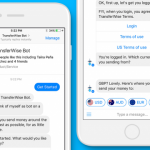Lloyds Bank offers Windows Hello facial and fingerprint recognition

Lloyds Bank customers will soon be able to log into their accounts through fingerprint scanners and facial recognition technology, rather than typing in passwords. According to the bank, it has teamed up with Microsoft to bring the Windows 10 authentication technology to its customers.
The biometric authentication technology, which Microsoft named Windows Hello, uses a combination of infrared technology and advanced software to identify the user in various lighting conditions. It was also emphasized that fraudsters can’t bypass the security measure by using a photograph.
Criminals able to empty ATMs using remote admin attacks

Back in February of this year researchers at Kaspersky Lab uncovered a series of mysterious fileless attacks against banks where criminals were using in-memory malware to infect banking networks.
A recent investigation into a Russian bank ATM, where there was no money, no traces of physical interaction with the machine and no malware, has thrown further light on this activity.
Windows 10's strong security will make mobile devices a more attractive target

As enterprises move to Windows 10, and take full advantage of the advanced security features offered in the operating system and in Microsoft Edge, cyber criminals will increasingly look towards the mobile ecosystem for exploits.
This is according to Fujitsu's latest report, which believes 2017 will see an even bigger increase in attacks against the mobile world.
TransferWise's Facebook Messenger bot lets you transfer money internationally

Top messaging services have evolved past their basic role, as the major players in this market look to differentiate their offerings from the rest of the crowd. Facebook, for instance, added a bot platform to Messenger last year to make it more relevant to businesses and consumers.
Through bots, businesses provide better customer service while consumers can more easily get in touch with service providers. The platform has quickly gained traction, with the latest addition to the fold being international money transfer service TransferWise.
Most banks aren't confident they can detect a data breach

Consumers are quite confident banks and insurers can keep their data safe, but these organizations aren’t that sure. A new report by Capgemini has shown that financial institutions lack a significant amount of confidence when it comes to data protection.
Just one in five (21 percent) of financial service organizations admitted they’re "highly confident" they could detect a data breach. On the other hand, 83 percent of consumers trust banks and insurers with their data.
Lloyds bank hit by DDoS attack

The Lloyds Banking Group fell victim to a massive cyberattack this week, that was responsible for temporarily disrupting its services.
The attack is being attributed to an international hacking group. It launched a distributed denial of service (DDoS) attack against the company's online services that lasted for two days. During this time, customers were reportedly unable to make payments online or check their account balances.
Banking apps are in dire need of an overhaul

It’s no secret that customers increasingly prefer to use mobile banking apps to manage their cash "on-the-go" over online banking. In fact, did you know that mobile banking apps are being used around 7,610 times a minute? Now consider this alongside the Competition and Markets Authority’s (CMA) recent announcement regarding UK banks having to offer the same customer service through its apps as can be found in high street branches. This means that customers will be able to access details of their entire finances through a single mobile phone app by 2018.
That’s a whole heap of data from bank statements, transfers, loans, overdrafts, savings, mortgages to name a few, for one person. Multiply this by the estimated 11 million of us who have already decided to swipe instead of log-on.
The benefits of cloud-connected spreadsheets

This year has been the year of spreadsheet distress. Spreadsheet errors have been blamed for a number of high profile corporate meltdowns including one in the rail franchise bid process for the West Coast mainline that is said to have cost the tax payer around £60m.
Spreadsheet calculations represent up to £38 billion of private sector investment decisions per year and simple errors could be putting billions of pounds at risk. With so many high profile incidents filling the newswires, it may seem unlikely that the spreadsheet is set for a reprieve in 2017. However, new developments in IT are set to allow businesses to cling on to their beloved spreadsheets in 2017 and make them robust enough to satisfy regulators and auditors who have already indicated that they consider them, in their existing state, to be a major potential risk.
Tesco Bank suspends online banking following fraudulent activity

Tesco Bank has taken the extraordinary measure of temporarily halting online transactions after thousands of customers experienced criminal activity in their accounts over the weekend. The move also means that customers are unable to use contactless payments.
Customers were alerted over the weekend via text message after suspicious activity was noticed in numerous accounts. Some have found that hundreds of pounds have gone missing from their accounts, but it is not clear whether the problem stems from a direct hack of Tesco Bank, or if a retailer suffered a security breach.
New tool offers SWIFT network protection through deception

Attacks on the inter-bank SWIFT system have been making the headlines this year, proving lucrative for the hackers and worrying for the industry.
Help is on the way though as Cyber security company TrapX is launching a deception-based security solution, DeceptionGrid, specifically designed protect SWIFT.
Few UK banks offer two factor authentication

According to new research from the consumers' association Which?, a number of major UK banks have failed to protect their customers online by not adopting two-factor security, which greatly protects against online banking fraud.
The association tested the customer-side security of 11 banks, revealing that over half had failed to implement two-factor ID checks on customers when they logged into their accounts. Lloyds Banking Group, Lloyds, Halifax, Bank of Scotland, Santander and TSB were the banks which scored the lowest on the tests conducted by Which?.
UK banks underreport cyber attacks

British banks are afraid that if they disclose the full picture of the cyberattacks they're under, they might suffer public backlash resulting in reputational damage and loss of customers. That's why they never fully report when they're under cyberattack. And the attacks are getting more frequent.
This is all according to Reuters, which cites Israeli-based cyber security firm Illusive Networks, Barclays, and others.
American Express customers phished using phishing prevention scam

In a rather ironic twist on traditional phishing attacks, customers of American Express are being targeted by a campaign promising them an identity theft and phishing prevention tool.
The phishing emails offer SafeKey use as bait. This is a legitimate program that Amex offers its customers as an additional layer of security to guard against ID theft and phishing.
HSBC uses facial recognition so customers can open new bank accounts with a selfie

Banks around the world are embracing biometrics as a way of securing customers' accounts. HSBC is taking things in a slightly different direction, however, giving business customers the ability to open a new account using a selfie.
While the selfie alone is not enough to open a bank account, it is used as part of the identity verification process. It uses facial recognition software to analyse a selfie taken on a smartphone.
Millennials would trust tech companies with money transactions

There’s a new report suggesting that banks need to seriously consider innovating, if they don’t want to hand over their business to tech companies.
The report, entitled "Are Banks Losing The Innovation Game?", was released by financial regulatory framework compliance experts, Neopay. It is based on a poll of 2,000 UK adults on their experience with high street banks and tech companies.
Recent Headlines
Most Commented Stories
BetaNews, your source for breaking tech news, reviews, and in-depth reporting since 1998.
© 1998-2025 BetaNews, Inc. All Rights Reserved. About Us - Privacy Policy - Cookie Policy - Sitemap.